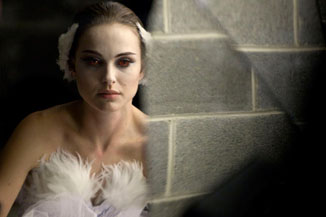Movie Review: Black Swan
By Matthew Huntley
December 8, 2010
BoxOfficeProphets.com

Natalie Portman stars as Nina Sayers, a background dancer in a New York City ballet company. Hitherto now, Nina has just been another extra on stage, but her director, Thomas (Vincent Cassel), has promised her a more prominent role in the upcoming season. The production will be “Swan Lake,” Tchaikovsky’s classic story about a princess turned into a white swan by an evil sorcerer. The princess’s only hope for breaking the spell is the true love of a prince, but her jealous twin, the black swan, tries to lure him away.
Black Swan is about how Nina’s life begins to mirror the show, so much that she develops physical and mental manifestations of her on-stage counterparts, which become more realized as the line between fantasy and reality grows increasingly blurred. Even we’re not sure what to make of the strange phenomena taking place, but it sure is fascinating to watch.
Given Nina’s lifestyle, it’s no wonder she’s always scared and timid like the white swan. She lives with her overbearing mother (Barbara Hershey), who still dresses her and tucks her in at night; she has no life outside of ballet; and she’s been sheltered from the types of experiences that mold children into adults. When she tells Thomas she’s not a virgin, we don’t quite believe her. Even if she’s had physical sex, it’s doubtful she’s ever experienced the real emotions that go along with it.
Because Nina has been conditioned to be perfect, she’s immediately threatened when a new dancer named Lily (Mila Kunis) arrives from San Francisco. She’s Nina’s size, shape and, from a distance, spinning image. For reasons I won’t reveal here, Nina starts to think Lily is after her. This is an external conflict that makes Nina more susceptible to her own internal one.
Director Darren Aronofsky hones his usual style and energy to bring this twisted tale to life. He’s the type of director who considers every cinematic resource before turning ordinary shots into ones that stand out, and with Black Swan, almost every shot stands out. Consider the way he shoots Nina’s body - sometimes in beautiful, elegant long shots, but mostly in grainy, tight close-ups, especially of her feet and nails, giving us a real sense of what dancing is doing to her - physically, emotionally, mentally. He heightens this effect by constantly reverting to the unsightly and mysterious rash growing on her back. These images may make our skin crawl, but that’s not their point. Aronofsky wants us to see beyond the romance of ballet and become immersed in the gritty, exhausting lifestyle of a dancer. Director of Photography Matthew Libatique does a delicate balancing act of presenting the graceful side of ballet while paying heed to the dark side of it.
It’s not just the visuals that make Black Swan powerful. Clint Mansell’s score and the overall sound design are just as inducing. We’re enveloped by the simple sounds of bumps and clicks on the hard dance floor; the needle going in and out of ballet slippers as they’re being sewn; and the breaking of glass. Watching the film, I was hardly aware of my own surroundings. I was pulled in without compromise and never able to look or listen away.
His visual and aural sense proves Aronofsky is a born filmmaker, but what makes him a born director is how he works with his actors and tells his stories. Natalie Portman gives one of her best performances in a role that could have easily tempted any actress to suggest her character’s metamorphosis too soon. She holds back and shows a lot of discipline and patience without breaking stride or overacting. Because Portman the celebrity is able to disappear into her role, we believe Nina has always been timid, frightened and wounded. Even when she does “let go,” there are remnants of her former self still there. Clearly, when Portman is paired with the right director, she proves she can handle the most risky material.
Black Swan is a film that just keeps building its story, drama and tension till the very end. There’s a moment in the final act when all its pent up emotions and sensations erupt and we’re completely entranced by the images taking shape before us. In the wrong hands, this material might have gone horribly wrong, but Aronofsky and his crew elevate it to an art form and we’re left spellbound.